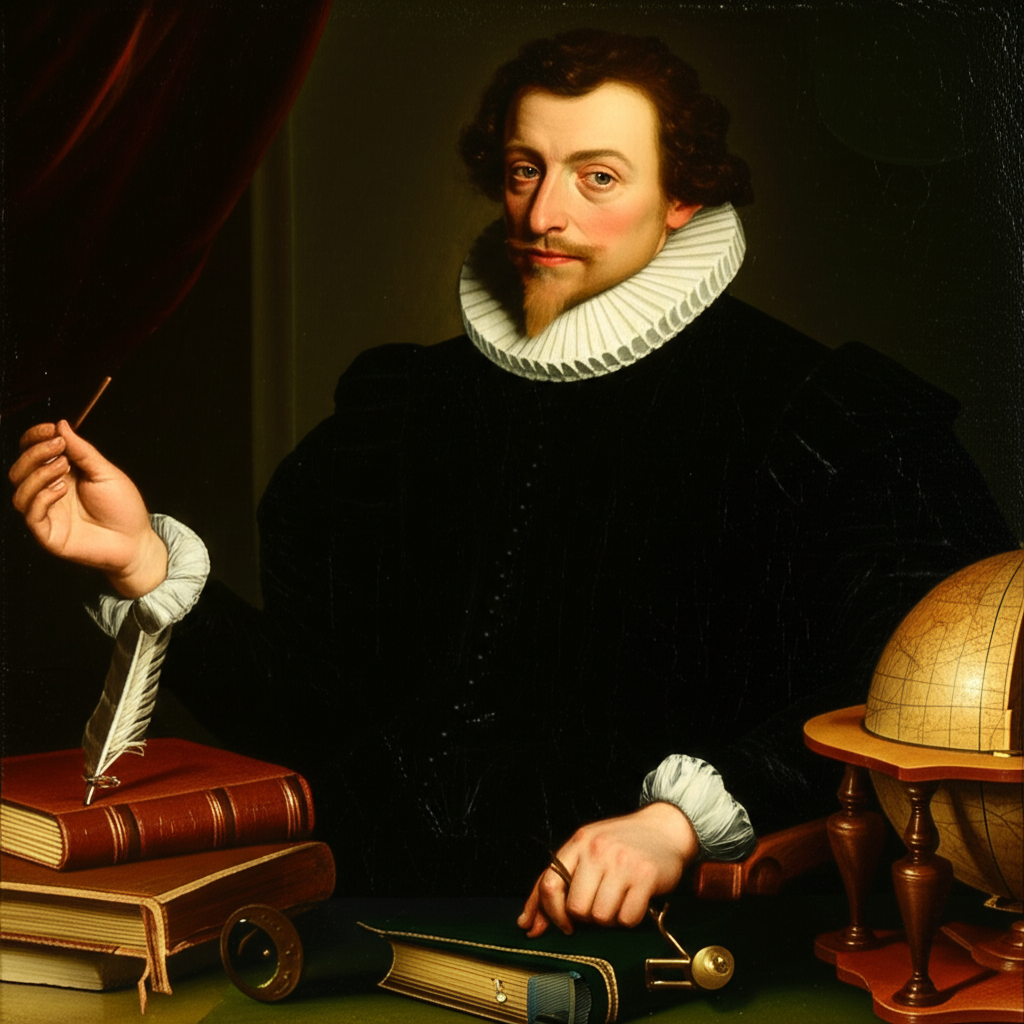
Francis Bacon
1561-1626
An Interactive Exploration by Kalviyogi Nagarajan 369 Tesla Pvt Limited
Francis Bacon was an English philosopher, statesman, scientist, and author who served as Attorney General and Lord Chancellor of England. Known as the father of empiricism and the scientific method, Bacon revolutionized both philosophy and prose writing. His essays established a new form of English prose - concise, practical, and aphoristic.
Key Facts:
- Developed the scientific method and inductive reasoning
- Created the modern English essay form
- Served as Lord Chancellor under King James I
- Advocated for empirical observation over classical authority
- His prose style influenced centuries of English writing
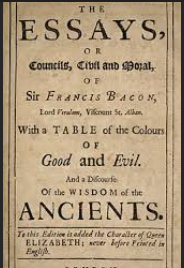
Bacon's most famous work, a collection of 58 essays covering topics from truth and friendship to studies and revenge. These essays established the English essay as a literary form and showcase Bacon's practical wisdom and aphoristic style.
Key Concepts:
Notable Essays:
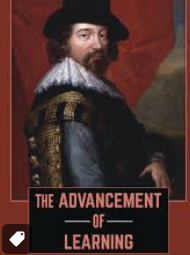
Bacon's first major philosophical work in English, advocating for the advancement of human knowledge through empirical observation and inductive reasoning. The work critiques medieval scholasticism and proposes a new approach to learning based on experience rather than authority.
Structure:
Book I: Defense of Learning - Refutes objections to learning - Argues for the dignity of knowledge Book II: Survey of Learning - Classification of human knowledge - Identification of gaps in learning
Key Concepts:
Key Quotes:
- "Knowledge is power"
- "If a man will begin with certainties, he shall end in doubts; but if he will be content to begin with doubts, he shall end in certainties"
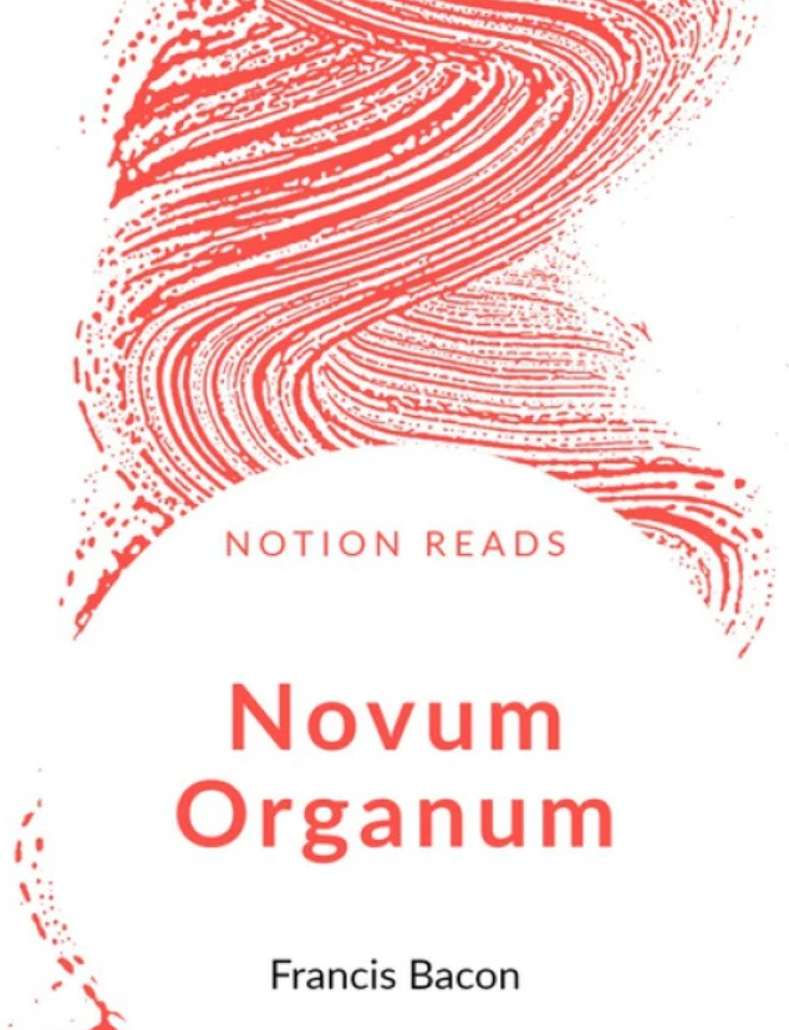
Bacon's most important philosophical work, presenting his new method of scientific inquiry. The title means 'New Instrument' and refers to Bacon's inductive method as opposed to Aristotle's deductive logic. The work introduces the concept of 'idols of the mind' - systematic errors in thinking.
Structure:
Book I: Critique of existing methods - The Four Idols of the Mind - Problems with deductive reasoning Book II: The New Method - Inductive reasoning process - Tables of investigation
Key Concepts:
Key Quotes:
- "Man, being the servant and interpreter of Nature, can do and understand so much and so much only as he has observed in fact or in thought of the course of nature"
- "The human understanding when it has once adopted an opinion draws all things else to support and agree with it"
Note: Part of Bacon's larger unfinished work 'Instauratio Magna' (The Great Renewal)
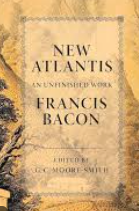
Bacon's unfinished utopian work describing the island of Bensalem, where scientific research is organized systematically for the benefit of humanity. The work presents Bacon's vision of how science and technology could improve human life through collaborative research.
Key Concepts:
Notable Characters:
The Father of Salomon's House, The Governor of Bensalem, European Sailors
Key Quotes:
- "The end of our foundation is the knowledge of causes, and secret motions of things; and the enlarging of the bounds of human empire, to the effecting of all things possible"
Note: Influenced the founding of the Royal Society and modern scientific institutions
Francis Bacon: Philosopher, Scientist, Statesman
From ambitious courtier to disgraced politician to father of modern science
Birth of Francis Bacon
Born at York House, London, to Sir Nicholas Bacon (Lord Keeper) and Lady Anne Cooke Bacon, a learned woman who translated religious works.
Trinity College, Cambridge
Enters Trinity College at age 12. Becomes critical of Aristotelian philosophy taught there, laying groundwork for his later empirical approach.
Gray's Inn Legal Training
Begins legal studies at Gray's Inn. Develops skills in rhetoric and argumentation that would serve him throughout his career.
Member of Parliament
Elected to Parliament for Melcombe Regis. Begins his long political career, though often struggles financially despite his talents.
Essays (First Edition)
Publishes first edition of Essays with only 10 essays. These practical, aphoristic pieces establish his reputation as a prose stylist.
Death of Elizabeth I
Queen Elizabeth dies. Bacon successfully transitions his loyalty to James I, beginning his rise to high office under the new king.
The Advancement of Learning
Publishes his first major philosophical work, advocating for empirical observation and the advancement of human knowledge through systematic study.
Solicitor General
Appointed Solicitor General by James I. His legal and political career reaches new heights as he gains the king's favor.
Attorney General
Promoted to Attorney General. Continues to rise in the legal hierarchy while pursuing his philosophical interests.
Lord Keeper of the Great Seal
Appointed to the same position his father held. Reaches the pinnacle of legal authority in England.
Lord Chancellor
Becomes Lord Chancellor and is created Baron Verulam. Achieves the highest legal office in the land.
Novum Organum
Publishes his masterwork on scientific method, introducing inductive reasoning and the 'Four Idols of the Mind' that obstruct clear thinking.
Viscount St. Alban
Created Viscount St. Alban, reaching the height of his political honors. However, this same year brings his downfall.
Impeachment and Disgrace
Charged with accepting bribes as Lord Chancellor. Confesses, is fined, imprisoned briefly, and banned from court and Parliament.
Essays (Final Edition)
Publishes the final, expanded edition with 58 essays. These mature reflections on human nature and practical wisdom become his most enduring work.
Death of Francis Bacon
Dies of pneumonia, reportedly contracted while experimenting with preserving meat in snow. Dies pursuing the scientific method he championed.
New Atlantis (Posthumous)
His utopian work describing a society organized around scientific research is published posthumously, inspiring the founding of the Royal Society.
Drag timeline to explore more events
Spenserian Stanza
Explore the unique 9-line stanza structure invented by Edmund Spenser
The Spenserian Stanza: 9 lines total - 8 lines of iambic pentameter (10 syllables) + 1 Alexandrine (12 syllables)
Rhyme Scheme: ABABBCBCC - Notice how the B and C rhymes interweave to create musical unity
These animations help visualize complex literary concepts that might be difficult to understand through text alone. Each animation is designed to enhance your understanding of the author's unique contributions to English literature.